Related Research Articles

Rose Tattoo are an Australian rock and roll band, now led by Angry Anderson, which formed in Sydney in 1976. Their sound is hard rock mixed with blues rock influences, with songs including "Bad Boy for Love", "Rock 'n' Roll Outlaw", "Nice Boys", "We Can't Be Beaten" and "Scarred for Life". Their first four albums were produced by Harry Vanda and George Young who also worked with AC/DC. They disbanded in 1987, subsequently reforming briefly in 1993 to support Guns N' Roses on an Australian tour. They reassembled again from 1998 and have since released two more studio albums.
Post is the first solo album by Australian singer-songwriter rock musician, Paul Kelly. Kelly had moved to Sydney by January 1985, after leaving his Melbourne-based Paul Kelly Band and the breakup of his marriage to Hilary Brown.

Ian William Rilen was an Australian musician. He was bass guitarist and songwriter with Rock N' Roll band Rose Tattoo, and led punk rock group X while also providing lead guitar, rhythm guitar and vocals. Rilen was born in Bendigo, Victoria, started his musical career in Sydney and later lived in Melbourne.
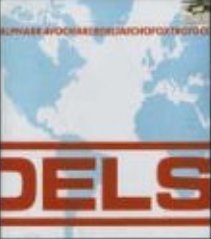
Alphabravocharliedeltaechofoxtrotgolf is the first album by Australian new wave group Models. The title alludes to the first seven letters of the NATO phonetic alphabet. The title also refers to the designations of the natural divisions in the 12-note Western music scale in the key of 'C'. The LP album cover claimed it was produced by no-one, in fact, it was recorded independently by engineer Tony Cohen and the group, prior to signing with Mushroom Records. It was released in November 1980, but no singles were released commercially from the album, although "Two People Per km²" and "Uncontrollable Boy" were on a 12-inch disc released to radio stations, and a music video was made for "Two People Per km²".
The Wild Cherries were an Australian rock group, which started in late 1964 playing R&B/jazz and became "the most relentlessly experimental psychedelic band on the Melbourne discotheque / dance scene" according to commentator, Glenn A. Baker.
Peter William "Pete" Wells was the founder and slide guitarist in Australian hard rock band, Rose Tattoo, from 1976 to 1983. He was previously bass guitarist with the pioneering heavy metal outfit Buffalo from 1971 to 1976. Wells also had a solo career and issued albums, Everything You Like Tries to Kill You (1991), The Meaning of Life (1992), No Hard Feelings (1993), Orphans (1994), Go Ahead, Call the Cops (1996), It's All Fun and Games 'till Somebody Gets Hurt (1999), Hateball (2000) and Solo (2002). In 2002, he was diagnosed with advanced prostate cancer and, on 27 March 2006, Wells died of the disease, aged 59. Rose Tattoo were inducted into the Australian Recording Industry Association (ARIA) Hall of Fame on 16 August of that same year.
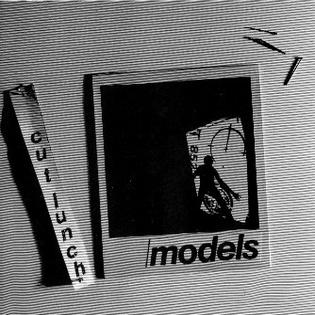
Cut Lunch is a mini-album or EP by Australian new wave band Models, originally released on 10" vinyl by Mushroom Records in June 1981.
Buffalo was an Australian rock band formed in August 1971 by founding mainstay Dave Tice on lead vocals (ex-Head). Fellow founders, also from Head, were Paul Balbi on drums, John Baxter on guitar, and Peter Wells on bass guitar; together with Alan Milano on lead vocals (ex-Mandala). Milano left after their debut album, Dead Forever..., and Balbi was replaced on drums by Jimmy Economou. Their next two albums, Volcanic Rock and Only Want You for Your Body, were also issued by Vertigo Records. After 1975 line-up changes resulted in a more commercial sound and the group disbanded in March 1977. Australian musicologist Ian McFarlane noted that there was "nothing subtle about Buffalo's primal, heavyweight sound, but it was delivered with a great deal of conviction ... combining the dense, heavy riffing ... with the progressive blues chops ... the band certainly captured the arrogant disposition of the times in a bold and thunderous fashion". Alongside Billy Thorpe & The Aztecs and Blackfeather, Buffalo pioneered Australia's heavy metal, pub rock and psychedelic rock movements. Peter Wells died on 27 March 2006, aged 58.

Lobby Loyde, also known as John Barrie Lyde or Barry Lyde, was an Australian rock music guitarist, songwriter and producer.
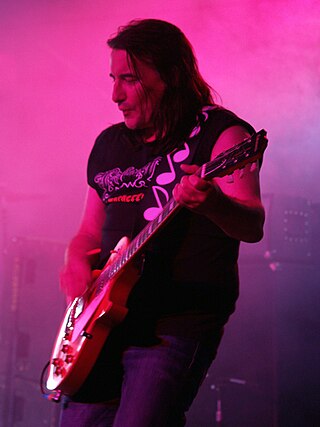
Michael Thomas Cocks, known professionally as Mick Cocks, was an Australian musician, most noted for his guitar and songwriting work with Rose Tattoo. His original sound and style heavily influenced Guns N' Roses, who recorded a cover of the Rose Tattoo song "Nice Boys". He was also a member of Heaven, The Headhunters, Illustrated Men, Doomfoxx, Pete Wells' Heart Attack, and the Ted Mulry Gang. On 16 August 2006, Rose Tattoo were inducted into the Australian Recording Industry Association (ARIA) Hall of Fame.
Harvey James born Harvey William James Harrop was an English-Australian rock guitarist. He was a member of the bands Mississippi (1973–74), Ariel (1974–75), Sherbet and the Party Boys (1982–83). James was diagnosed with lung cancer in July 2010 and died on 15 January 2011, aged 58, leaving behind his three children, Gabriel, Alexandra and Joshua.

Rose Tattoo is the debut self-titled album by Australian hard rock band Rose Tattoo released in November 1978 on the Albert Productions label. It was produced by the famous Vanda & Young team who have worked with AC/DC, The Angels and Stevie Wright. The album was released as Rock 'n' Roll Outlaw in some markets. Eight bonus tracks were added for the 1990 CD edition for Repertoire Records.

Local &/or General is the second studio album by Australian new wave rock band Models, which peaked at #30 on the Australian albums chart. It was released in October 1981 on Mushroom Records with Stephen W Tayler producing.
Gregory John Macainsh is an Australian former musician and songwriter. He provided bass guitar and backing vocals for pop rockers, Skyhooks from 1973 to 1980 and subsequently for various reformations. According to Australian musicologist, Ian McFarlane, "Macainsh's biting, provocative songs were the perfect expression of adolescent obsessions and frustrations. With those songs, the band made an enormous impact on Australian social life." Macainsh became an intellectual property lawyer.
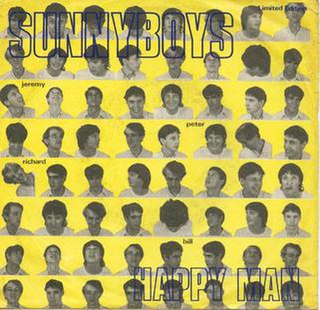
"Happy Man" is a song by Australian power pop band, Sunnyboys. It was written by lead singer-guitarist, Jeremy Oxley, and was the first single released in June 1981, on Mushroom Records, from their self-titled debut album, which followed in September. The studio tracks were produced by Lobby Loyde and engineered by Colin Freeman at Alberts Studios, Sydney. "Happy Man" reached No. 26 on the Kent Music Report singles chart. The live tracks were recorded at the Bombay Rock, Brunswick.

Mark Kennedy is an Australian musician who has been the drummer for several artists including Spectrum (1969–70), Doug Parkinson in Focus (1971), Leo de Castro (1971–73), Ayers Rock (1973–76), Marcia Hines (1976–83), Men at Work (1985), Renée Geyer and Jimmy Barnes (2005).
Chris Moraitis, who performed as Mándu, was an Australian rock music vocalist. He released his debut solo album, To the Shores of His Heaven, in 1974. He joined Lobby Loyde's Southern Electric group and was recorded on two of their albums, Obsecration and Live with Dubs. According to Australian musicologist, Ian McFarlane, Mándu had "a distinctive and emotional voice" and his solo album, "stands as a worthwhile period piece, a work graced with elegant songs, soaring arrangements and fine musicianship." However, in 1980 he "disappeared from view, re-emerging briefly during the mid-1980s with a band called Mándu Bándu."
The Zimmermen were an Australian rock and country music group, which formed in June 1983. Members included John Dowler on vocals, Mick Holmes on guitar and vocals, Graeme Perry on drums, and Peter Tulloch on guitar. They released two albums, Rivers of Corn, Way Too Casual, before disbanding in 1990. Former guitarist Steve Connolly died in 1995.
Band of Talabene were a briefly existing Australian blues rock band formed in April 1972 as Willy & the Philtones by Tony Buettel on drums, Phil Gaunt on bass guitar, Phil Manning on lead guitar and lead vocals, and Tony Naylor on guitar and vocals. According to Australian musicologist, Ian McFarlane, their name was both, "[a] homage to bands like Derek and the Dominoes and because it comprised two Phils and two Tonys." In July Gaunt was replaced on bass guitar by Gus Fenwick (ex-Pleazers) and they were renamed as Band of Talabene. Manning explained that his young daughter had dreamt of a band, Talabene, with pumpkins playing guitars.
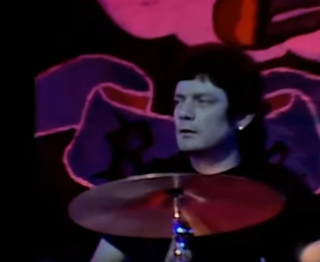
Dallas Leslie "Digger" Royall was an Australian hard rock drummer. He was a member of Band of Talabene (1973), Buster Brown (1975) and Rose Tattoo (1976–1983). He died of an unspecified cancer in 1991 while being treated for heroin and alcohol addictions.
References
- General
- Kimball, Duncan. "Milesago: Australasian Music and Popular Culture 1964–1975". Ice Productions. Retrieved 18 June 2011.
- McFarlane, Ian (1999). "Whammo Homepage". Encyclopedia of Australian Rock and Pop . St Leonards, NSW: Allen & Unwin. ISBN 1-86508-072-1. Archived from the original on 5 April 2004. Retrieved 18 June 2011. Note: Archived [on-line] copy has limited functionality.
- Specific
- 1 2 3 4 5 6 7 McFarlane 'Buster Brown' entry. Retrieved 18 June 2011.
- 1 2 3 4 Holmgren, Magnus. "Buster Brown". Australian Rock Database. Passagen.se (Magnus Holmgren). Archived from the original on 27 November 2013. Retrieved 1 March 2014.
- ↑ Kimball, Sunbury Festival 1974. Retrieved 19 June 2011.
- ↑ Cockington, James (2001). "The Cardie Cult". Long Way to the Top: Stories of Australian Rock & Roll. Sydney, NSW: Australian Broadcasting Corporation (ABC). pp. 179–182. ISBN 978-0-7333-0750-8.
- ↑ McFarlane 'The Ferrets' entry. Retrieved 18 June 2011.
- ↑ McFarlane 'Rose Tattoo' entry. Retrieved 18 June 2011.
- ↑ Holmgren, Magnus. "Rose Tattoo". Australian Rock Database. Passagen.se (Magnus Holmgren). Archived from the original on 22 October 2013. Retrieved 1 March 2014.
- ↑ Nimmervoll, Ed. "Rose Tattoo". Howlspace – The Living History of Our Music (Ed Nimmervoll). White Room Electronic Publishing Pty Ltd. Archived from the original on 28 January 2003. Retrieved 11 February 2014.
- ↑ "Rock and Roll Lady". APRA search engine. Australasian Performing Right Association (APRA). Archived from the original on 24 September 2012. Retrieved 24 June 2011.
- ↑ "Let Me In". APRA search engine. Australasian Performing Right Association (APRA). Archived from the original on 24 September 2012. Retrieved 24 June 2011.
- ↑ "Buster Brown". APRA search engine. Australasian Performing Right Association (APRA). Archived from the original on 24 September 2012. Retrieved 24 June 2011.
- ↑ "Roll Over Beethoven". APRA search engine. Australasian Performing Right Association (APRA). Archived from the original on 24 September 2012. Retrieved 24 June 2011.
- ↑ "Young Spunk". APRA search engine. Australasian Performing Right Association (APRA). Archived from the original on 24 September 2012. Retrieved 24 June 2011.
- ↑ "Apprentice". APRA search engine. Australasian Performing Right Association (APRA). Archived from the original on 24 September 2012. Retrieved 24 June 2011.
- ↑ "Something to Say". APRA search engine. Australasian Performing Right Association (APRA). Archived from the original on 24 September 2012. Retrieved 24 June 2011.